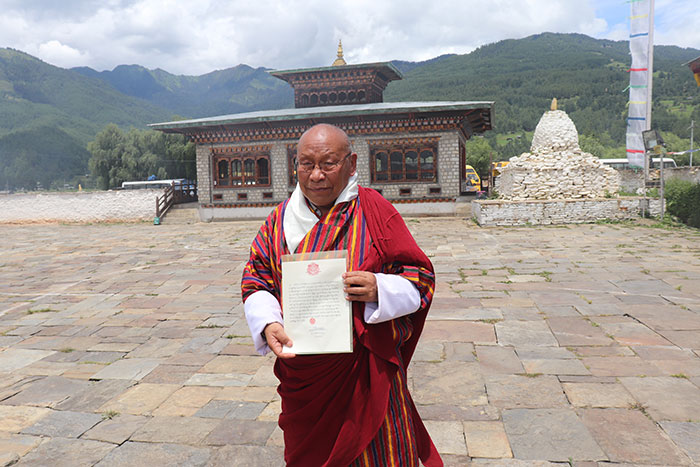Dasho Sangay Dorji was 74
Rinzin Wangchuk
As the news of the passing away of the Druk Thuksey recipient, Dasho Sangay Dorji, spread far and wide, condolences poured in from across the country.
Saddened by the news, his close friends and colleagues described Dasho Sangay Dorji’s death as a great loss to the nation. He is one of the last scholars and prolific writers in the country.
The former secretary of the Dzongkha Development Commission (DDC), Dasho Sangay Dorji passed away at the Thimphu national referral hospital on the night of August 17. He was 74.
Popularly known as Drungchen Sangay Dorji, the late Dasho was a man of humility, academically highflyer and was passionate about any responsibility or task that was given to him. “He would work late night and woke up early in the morning to ensure that the task was done,” said Lopon Kuenzang Thinley who worked with Dasho Sangay Dorji writing and editing books.
Dasho Sangay Dorju was awarded the Druk Thuksey (Heart Son of Bhutan) medal by His Majesty The King in recognition of his extraordinary service to the nation during the National Day Celebration in Thimphu in 2019.
Earlier in July 2019, His Holiness the Je Khenpo awarded an appreciation and recognition letter to Dasho Sangay Dorji for his contribution in preserving and promoting the national language. In the letter of appreciation, His Holiness underlines language as the heart of culture which is at the heart of safeguarding the country’s independence.
Dasho Sangay Dorji was conferred the red scarf with the title Dasho by His Majesty The fourth King in 1999 coinciding with the silver jubilee celebrations.
His Majesty also appointed him as the first secretary of DDC when it was established in 1986.
Dasho Sangay Dorji was born into a religious family in Chutoed village of Tang, Bumthang, in 1946 as an ordinary child. But his early childhood was extraordinary. At 11, he completed chagbum (100,000 prostrations) and at 13, ngondro (preliminary practices). It was rigorous grooming to prepare him for a religious life.
In 1961, when the erstwhile Rigzhung Lobdra was started at Wangditse in Thimphu, eager to explore the world beyond Bumthang, he set off to Thimphu on a seven-day gruelling journey on foot carrying a backpack of foodstuff. He was 15. In the next few years, he would undertake the journey between Tang and Thimphu at least 14 times.
Barely three years after studying under Dilgo Khyentse Rinpoche, the first principal of Rigzhung Lobdra, he was appointed a teacher for a monthly salary of Nu 30. And three years later, he became the personal secretary to Dasho Shingkhar Lam in the office of the Third Druk Gyalpo, marking the beginning of his long, distinguished literacy career.
He served six years in the office of the Third Druk Gyalpo, 20 years in the National Assembly Secretariat from 1968-1986, 27 years in DDC, and five years with the Department of Culture.
Dasho Sangay Dorji was among the first writers to record the proceedings of the National Assembly, write laws based on the Thrimzhung Chenmo, textbooks for schools, Rigzhung Lobdra and non-formal learners, bilingual dictionaries, and guidebooks on driglam namzha.
After retiring from the civil service in 2006, Dasho had been on contract with DDC and the culture department. During this period, he co-authored with three other scholars, a Bhutanese biography of Guru Rinpoche.
According to Lopon Kuenzang Thinley, Dasho Sangay Dorji was writing the history of Bhutan before Zhabdrung’s era before he passed away.


